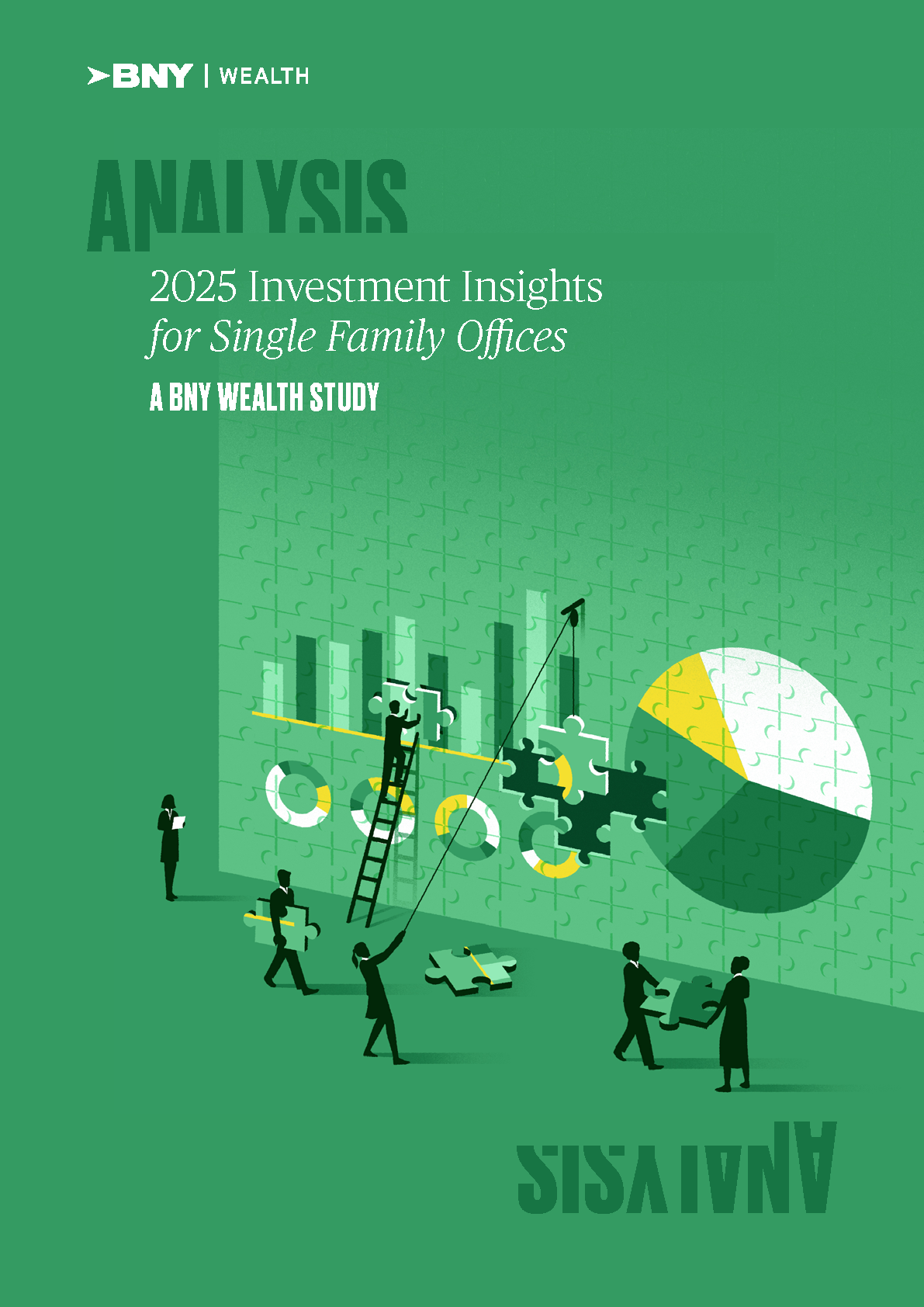Family offices are leaning into AI and crypto, seizing on two of the most dynamic investment themes.
Highlights
• 83% rank artificial intelligence (AI) as a top conviction theme for the next five years.
• 52% are using AI in their investment decisions.
• 74% are investing in or exploring cryptocurrency.
While portfolio allocations in traditional assets, such as stocks and bonds, are not going anywhere soon, investments that were once looked upon with skepticism are now picking up steam among the world’s most sophisticated investors.
Our latest survey of ultra-high-net-worth families, with assets ranging from $250 million and up, reveals that family offices are seeking opportunities in disruptive technologies such as AI and cryptocurrency. The mounting enthusiasm for both reflects a growing willingness among wealthy families to engage in strategic risk-taking while reaping the benefits of thematic tailwinds that are likely to continue attracting capital well into the future.
AI’s Expanding Influence
Single family offices are overwhelmingly focused on AI, with 83% of global respondents noting it as one of their top focuses for the next five years.
Optimism about AI is helping to drive interest in growth-focused private equity. Moreover, more than half (52%) of family offices are not only investing in the space, but they are also using AI to make investment decisions.
Importantly, this demonstrates that AI is not only attracting investment dollars from some of the world’s wealthiest families but is also becoming more prevalent in their day-to-day operations, bolstering total demand.
Three Drivers of AI Optimism
1. Infrastructure & Monetization
The largest cloud service providers have significantly increased their capital expenditures (capex) to build out AI data centers, which support growing computing, storage and networking needs. These companies are so dedicated to an AI-dominant future that capex is expected to grow 54% through 2025 to over $332B. This is after a 65% increase in 2024, demonstrating growing global demand from a broadening set of AI use cases.
2. Use Cases Across Industries
AI deployment within companies is facilitating productivity and revenue gains. For example, one multinational tech company rooted in e-commerce reduced its cost to serve in certain warehouses by 25% during peak periods, saving over $10B annually after broader rollout. In addition, a pharmaceutical juggernaut is using AI for drug discovery and reaching preclinical milestones faster, with a 40% improvement in time. Other examples include a payment processing provider using AI to drive efficiencies in call centers and a cybersecurity firm deploying the technology for human resources and training purposes.[1]
3. Innovation Ecosystem
While the AI race has permeated everything from news to politics and investing, the U.S. is leading the way in private dollars for innovation, with a cumulative private investment of $470.9B from 2013-2024.[2] Access to the leading semiconductors, sizeable investments from venture capitalists (especially with family offices now in the mix), and research and development support from the top universities are all paving the way for fast-paced innovation and U.S. leadership.
Crypto Moves from Curiosity to Consideration
Cryptocurrency is surging in popularity among family office decision-makers as well. Following Bitcoin’s meteoric rise on the heels of the pandemic, there was hesitancy among institutions to invest in this speculative corner of the market, and many questioned the intrinsic value of digital assets.
While debate continues, broader reluctance to this asset class has subsided at the margin, and now some of the world’s largest financial institutions advise crypto companies on public listings and bond offerings, and others provide loans backed by crypto portfolios for wealthy clients.[3] Similarly, the U.S. government recently enacted legislation on digital assets, requiring stablecoin issuers to back their tokens with cash or short-term Treasury bonds, among other regulatory measures.[4]
Consistent with the broader adoption trends, nearly three-quarters (74%) of family office professionals have either invested in cryptocurrencies or are exploring the possibility, a 21% increase over the prior 12 months. This is in stark contrast to the results of the 2024 study, which showed family offices were divided in their attitude toward digital assets, with 38% reporting zero exposure or interest.
Potential catalysts for the increased enthusiasm include the SEC approving the first Bitcoin ETFs at the start of 2024 and a more crypto-friendly U.S. administration entering the scene that November, resulting in a 367% surge in professionals reporting they were exploring the space.
At the time of the 2025 study, 86% of U.S. family offices were more likely to consider cryptocurrency due to the outcome of the 2024 U.S. presidential election.
Looking Ahead
AI and crypto are having undeniable effects on investments and many anticipate this influence will increase over time.
For family offices, both represent a blend of innovation, diversification and long-term growth potential. As adoption deepens, both themes are poised to play a larger role in shaping the future of wealth management.

To find out more about how the world’s wealthiest families are investing, download the full BNY Wealth study.
[1] BNY and company filings. Data as of 2025.
[2] Tech Monitor: Global AI venture capital reaches $110bn in 2024, driven by foundational models. February 12, 2025.
[3] The New York Times: Behind Wall Street’s Abrupt Flip on Crypto. August 13, 2025.
[4] Wired: The Loophole Turning Stablecoins into a Trillion-Dollar Fight. September 3, 2025.




